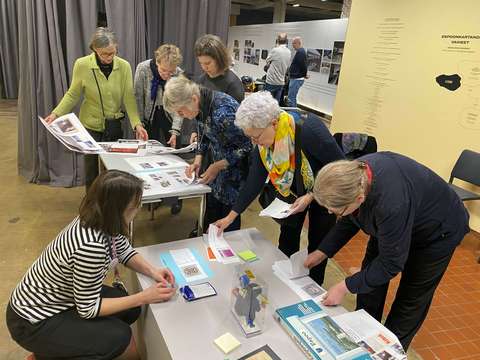Projects
KAMU Espoo City Museum regularly produces new research data and, as the data accumulates, new, interesting perspectives on Espoo’s history are sought. The results of the research are used, among other things, as basic information in the planning of exhibitions.
KAMU’s Cultural Heritage Education Model
KAMU, the Espoo City Museum, develops principles and practices for sustainable cultural heritage education. The purpose of the project is to create a unified model for planning and implementing museum-based education for children and young people.
In 2025, KAMU – the Espoo City Museum – launched a development project to create an operational model for sustainable cultural heritage education. The model will renew the museum’s approach to providing cultural heritage education, particularly through learning services offered to early childhood education, comprehensive school education, and upper secondary education.
The model promotes all dimensions of sustainability—ecological, economic, social, and cultural—within the museum’s learning services. It will guide the planning and implementation of learning services while strengthening children’s and young people’s participation in cultural heritage.
KAMU’s learning services offer learners of all ages a multisensory and interdisciplinary window into the lives of people in the past, supporting the national core curriculum and its objectives.
The project has received funding from the Finnish Heritage Agency’s grant for innovative projects. Its results will be shared widely: the new model and a four-part podcast series will provide inspiration for museum professionals, teachers, and students in the fields of cultural heritage and education. The podcast series will be published during 2026.
More information about the project:
Sonja Vistala
project coordinator
KAMU Espoo City Museum
Tel. +358 40 6365679
sonja.vistala@espoo.fi

The WeeGee Exhibition Centre is getting a new "kamu” when the premises and contents of the KAMU Espoo City Museum are renewed. In the future, KAMU WeeGee will be a gathering place for different experiences of Espoo and the city, bringing current perspectives on the city, place and community into the discussion. KAMU WeeGee will create opportunities for identification and meaningful content for the residents from a wide range of backgrounds.
The new KAMU WeeGee will feature changing exhibitions on current phenomena, more permanent Espoo content, a functional and participatory urban laboratory and associated co-creation space, in addition to a diverse range of other programs.
The new KAMU WeeGee will be created together with the city residents, museum visitors and passers-by! If you want to get involved in the development, please follow KAMU on social media, join the kampparit-list or contact the project managers directly.
For more information about the project:
Senior Curator Tomi Heikkilä, Tomi.Heikkila@espoo.fi,
Senior Advisor Johanna Vähäpesola, Johanna.Vahapesola@espoo.fi.
#uusikamuweegee #kamuespoonkaupunginmuseo
KAMU Espoo City Museum's Digital Policy project aims at creating an operating model for defining a sustainable and socially effective digital strategy for cultural heritage organisations. The project will create for KAMU Espoo City Museum its own digital policy and for all museums a written Digital Policy Checklist, which will serve as a guide and tool for planning the museum's digital services policies. The project has received financial assistance from the Finnish Heritage Agency which grants assistance to innovative projects.
The project will test a collaborative process involving museum staff, audiences and stakeholders in selecting priorities for digital services. The experiences and wishes of the public and museums on digital services will be explored through online surveys and meetings during 2024.
The aim of the operating model is to guide museums to socially, ecologically, economically and culturally sustainable and necessary digital services, while at the same time strengthening the social effectiveness of museums. The operating model is hoped to result in the continuous evaluation and development of the impact of digital services in museums, as well as to strengthening cooperation between museums in terms of digital services.
The results of the project will be presented at a webinar for museums on Tuesday 17 September 2024 entitled "Inspiration and tools for future digital services", which will also include the publication of a new guide " Digital policy checklist – A tool for drawing up guidelines for your museum’s digital services". The KAMU Digital Policy and the Digital Policy Checklist will be published on the KAMU website and made freely available.
Online Seminar: Inspiration and tools for future digital services
Project publications can be found at the bottom of the Information about KAMU page.
Inquiries:
Harri Hihnala,
Project Manager, Museum Producer (digital services)
KAMU – Espoo City Museum
Tel. +358 40 6365962
harri.hihnala@espoo.fi
Mirja-Liisa Autere
Project Coordinator (digital services)
KAMU – Espoo City Museum
Tel. +358 40 6344468
mirja-liisa.autere@espoo.fi
Funding from the Erasmus+ program for adult education enables KAMU to carry out fifteen European mobilities. Half of the mobilities are intended for training events, such as conferences, and the other half are for so-called job shadowing, where the participant follows work in another museum.
The aim of the project is to learn more about diversity, equity, accessibility and inclusion and to learn ways to make our services and content relevant also for learners who are not currently using the museum’s services. We also want to get to know different museum and exhibition concepts in order to get new ideas for the development of KAMU's various museums, while building networks with other European organizations.
The project will continue as KAMU has been granted with Erasmus+ accreditation for the years 2023-2027.(external link, opens in a new window)

